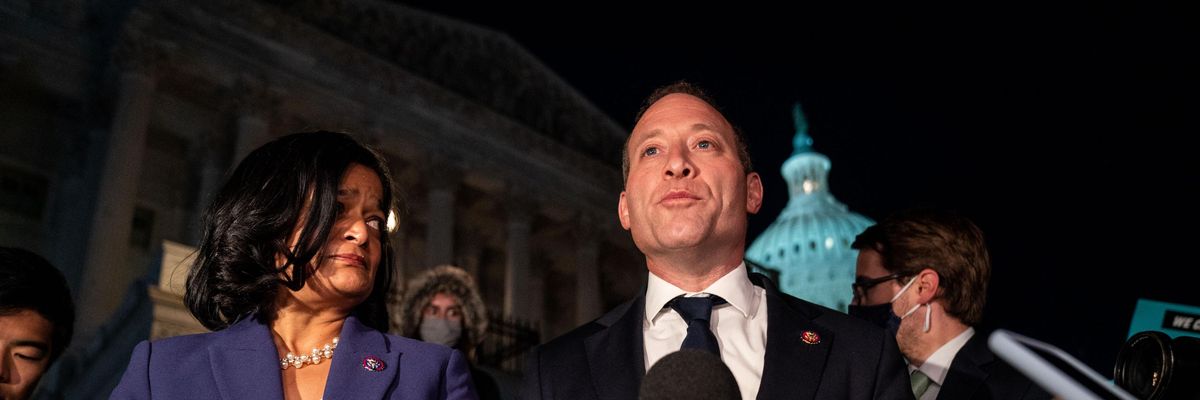As House members await the Congressional Budget Office's cost assessment of the Build Back Better package, outside progressives are attempting to hammer home their view that right-wing Democrats' expressed concerns about the looming CBO deficit projection are completely cynical--and should be treated as such.
"The whole 'pay for' thing is a right-wing scam, and Democrats are dumb for playing by GOP rules that the GOP doesn't itself follow."
"When this is used as a pretense to further gut the bill, remember that 100% of concern about this CBO score is bad faith. Not 99%. 100%," Vox's David Roberts tweeted Monday in response to news that the Biden White House is urging lawmakers to disregard the agency's analysis, which the administration reportedly expects to diverge from its own cost estimates.
"The same corporate 'moderates' feigning concern about the CBO score are the ones fighting to reduce taxes on the wealthy in the bill," Roberts added. "The deficit's got fuck-all to do with it."
According to the New York Times, the CBO is "likely to find that the cost of the overall package will not be fully paid for with new tax revenue over the coming decade."
The central disagreement between the White House and the ostensibly nonpartisan CBO--which is currently headed by a Republican--is over the projected amount of federal savings that would be produced by investing in IRS enforcement.
The Times reported that the CBO believes funding an IRS crackdown on rich tax evaders, as proposed by the Build Back Better Act, would bring in about $120 billion over a decade, whereas the White House has said the plan would raise $400 billion.
But as The American Prospect's Alex Sammon observed on Tuesday, it's unclear how the budget agency will include the $120 billion figure in its overall cost analysis given that "the CBO, by rule, is not allowed to say that investing money in the IRS will result in the 'secondary effect' of better tax collection."
"Under budget guidelines set by Congress and the White House, the nonpartisan organization is precluded from counting money that will be spent on enforcement as increasing revenue, even when, as in this case, the allocation to the IRS would indeed be a revenue-raiser," Sammon explained. "In general terms, that means that Congress is incentivized to gut the IRS (and every other enforcement agency) because, by rule, cutting spending is the only way to realize budget savings."
"In this specific case," he added, "it means that the CBO is prevented from making an accurate assessment of the cost of the Build Back Better Act, which may result in the whole legislation being scrapped."
Over the past several months, the Build Back Better package has been dramatically weakened to appease corporate-backed Democrats whose votes are needed to get the bill through the narrowly divided House and Senate.
After removing priorities such as dental and vision benefits for Medicare and slashing funding for the remaining programs--including universal pre-K--Democrats currently have a bill that includes roughly $1.8 trillion in spending over 10 years, about half of what was proposed in the original framework.
Now even the pared-back version is under threat from a handful of conservatives in the House and Senate who, in exchange for their votes, are demanding a CBO score that aligns with President Joe Biden's insistence that the bill is "fully paid for."
Earlier this month, five corporate Democrats in the House--Reps. Ed Case of Hawaii, Josh Gottheimer of New Jersey, Stephanie Murphy of Florida, Kathleen Rice of New York, and Kurt Schrader of Oregon--said in a statement that they would not vote for the Build Back Better Act until "we receive fiscal information" from the CBO, which is expected to release its analysis on Friday.
Those five Democrats committed to voting for the Build Back Better Act by the end of this week as long as the CBO assessment is "consistent" with White House cost projections.
Progressives, for their part, reject the notion that corporate Democrats actually care about the CBO's estimate of the Build Back Better Act's deficit impact, arguing that they're likely using deficit concerns as a cover for their objections to extremely popular elements of the bill, such as drug price reform.
"Budget scoring has become a persistent weapon, cherry-picked for political and ideological ends," Sammon noted Tuesday.
Just this month, the same right-leaning House Democrats who are currently holding up the Build Back Better Act eagerly rammed through bipartisan infrastructure legislation that--according to the CBO--would add $256 billion to the deficit over the next decade.
That small group of House Democrats was quiet about the bipartisan bill's projected deficit impact, as was Sen. Joe Manchin (D-W.Va.), one of the key architects of the legislation. Meanwhile, Manchin--a coal profiteer who has succeeded in removing key climate programs from the Build Back Better Act--has repeatedly threatened to tank the reconciliation by warning about its potential impact on the national debt.
"Throughout the last three months," Manchin said in a recent statement, "I have been straightforward about my concerns that I will not support a reconciliation package that expands social programs and irresponsibly adds to our nearly $29 trillion in national debt that no one else seems to care about."
In the face of such glaring hypocrisy, MSNBC's Mehdi Hasan argued late Monday that "the whole 'pay for' thing is a right-wing scam, and Democrats are dumb for playing by GOP rules that the GOP doesn't itself follow (remember the Trump tax cuts?)."
"Dems, as ever, are their own worst enemies," Hasan added.

